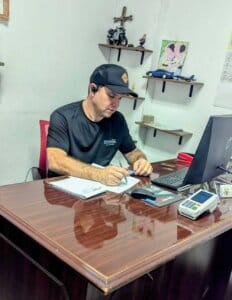Are your noisy brakes trying to tell you something?
If your car is squealing, grinding, or making unexpected sounds every time you hit the pedal, it’s time to pay attention. Noisy brakes are more than just annoying — they’re often an early warning sign of trouble that can affect your safety and cost you more in the long run.
Don’t Ignore the Warning Signs: What Noisy Brakes Are Telling You
Your brakes are one of the most critical components of your car, yet they often go unnoticed—until something goes wrong. Have you ever heard strange sounds like squealing, grinding, or clicking when you press the brake pedal? While these noises might seem minor at first, they’re often warning signs of serious issues that can compromise your safety—and lead to expensive repairs if left unchecked.
Why Do Brakes Make Noise?
Brake noises usually indicate that something isn’t functioning properly. Here are some of the most common reasons:
-
- Worn brake pads: When brake pads are too thin, the metal wear indicators make a high-pitched squeal to alert you they need replacement. Ignoring this can damage the rotors and result in costly repairs.
-
- Warped or damaged rotors: Uneven surfaces on the rotors can cause vibrations and scraping noises when braking, affecting performance and stability.
-
- Contaminated brakes: Dirt, oil, or moisture on the brake pads or rotors can create squeaking noises and reduce braking efficiency.
-
- Loose or misaligned components: Loose bolts or brackets in the braking system can lead to intermittent clicking or rattling sounds.
The Risks of Ignoring Noisy Brakes
Delaying brake repairs can lead to dangerous situations. Some risks include:
-
- Reduced stopping power: Your vehicle may take longer to stop, especially in emergencies.
-
- Damage to other components: Rotors, calipers, and other parts can suffer damage, leading to higher repair costs.
-
- Increased accident risk: Failing brakes can leave you unable to stop in critical moments, putting you and others on the road at risk.
How to Prevent Brake Problems
Keeping your brakes in good condition requires regular maintenance and attention. Here are some practical tips:
-
- Schedule routine inspections: Have your brakes checked every six months or before long trips to catch issues early.
-
- Avoid unnecessary hard braking: This helps prevent excessive wear on your pads and rotors.
-
- Pay attention to warning signs: If you hear unusual noises, feel vibrations, or notice changes in how your brakes respond, seek professional help immediately.
The Consequences of Ignoring Brake Issues: A Common Story
Picture this: you’re driving to work, and you notice a faint squeal every time you brake. You ignore it, thinking it’s nothing serious. Weeks later, that squeal turns into a loud metallic grinding, and your car begins to vibrate when stopping. Now, not only do your brake pads need replacing, but the rotors are damaged too—doubling the repair cost.
This is a situation many drivers face, but it’s entirely avoidable with timely maintenance and professional diagnostics.
The Solution: EPR Auto Clinic
If you’re dealing with brake issues, don’t wait for the problem to escalate. At EPR Auto Clinic in Newark, NJ, we provide thorough diagnostics, reliable repairs, and free inspections with every oil change. Our goal is to keep you safe on the road while delivering top-notch service backed by a 1-year or 10,000-mile warranty.
New customers can also take advantage of 10% off brake services! Call us at (973) 392-6830 or email us at eprautoclinic@gmail.com to schedule your service today. Click here to learn more about our brake repair services.





